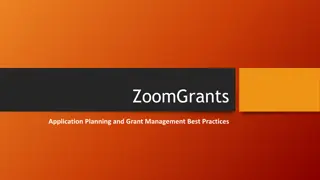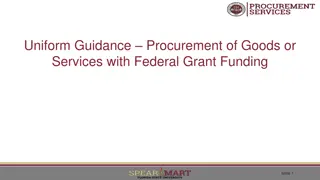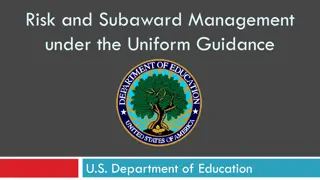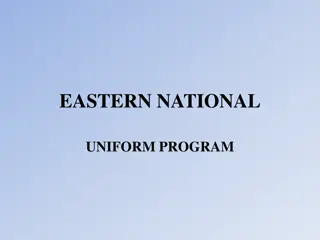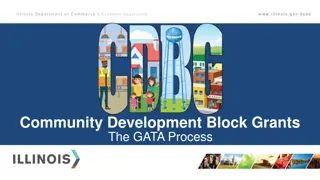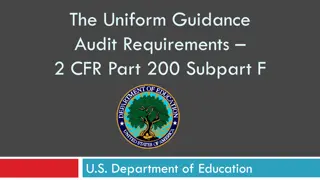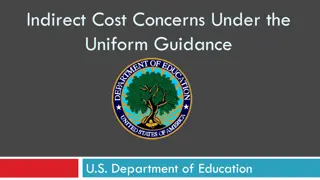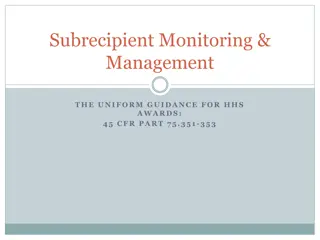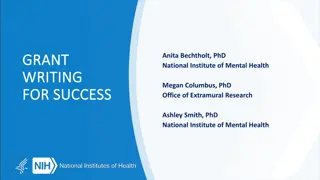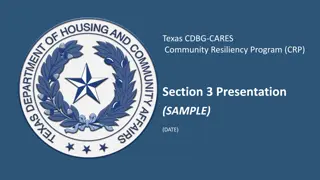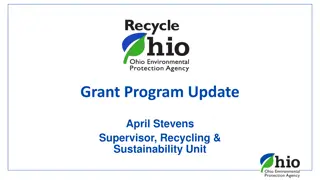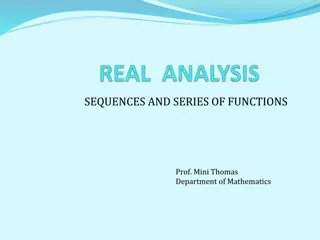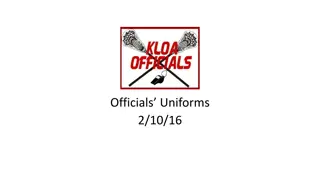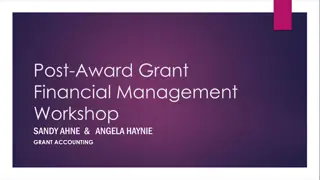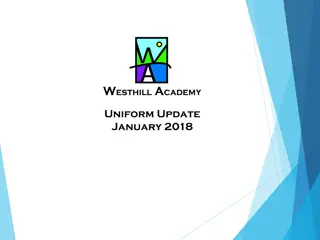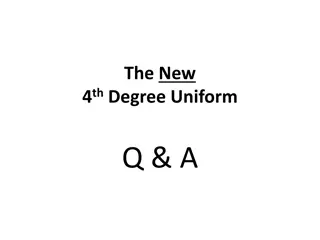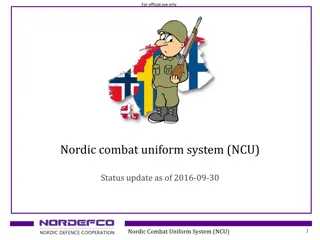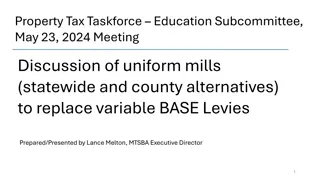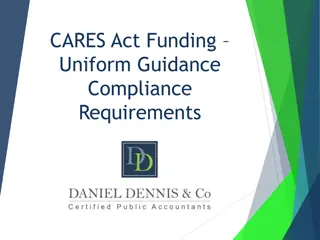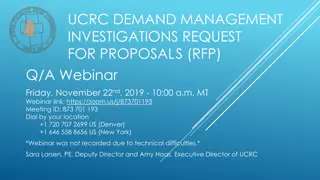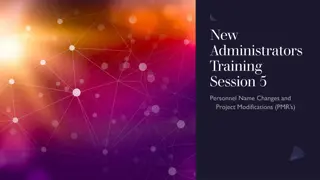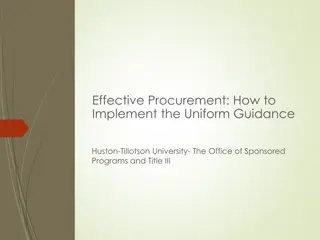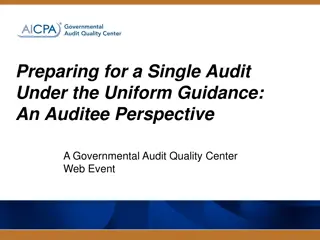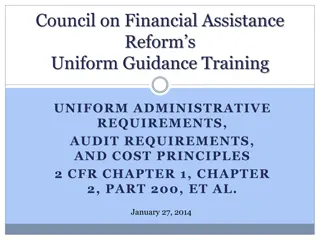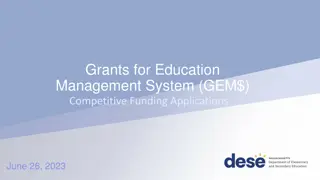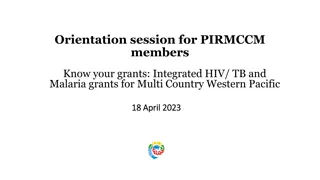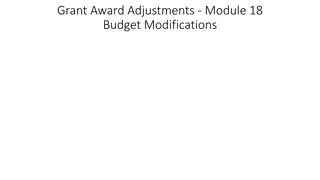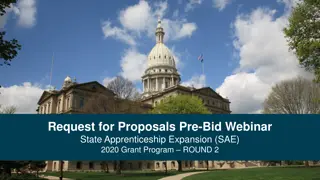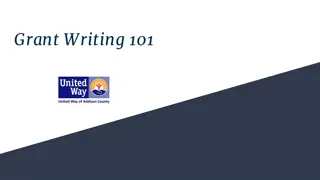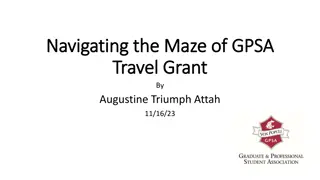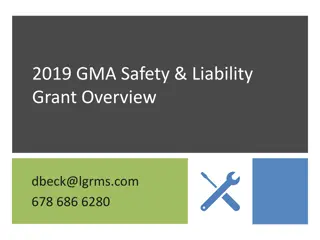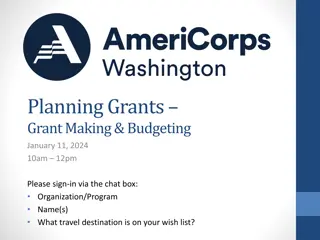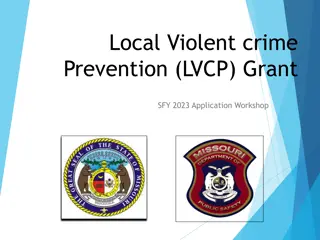Understanding Uniform Guidance in Grant Management
The Uniform Guidance under 2 CFR 200 streamlines federal grant management regulations into one consolidated set of guidelines effective since December 26, 2014. It replaces eight OMB circulars and applies to federal agencies making awards and non-federal entities receiving them, including various governmental and tribal entities. The guidance is divided into six parts and includes definitions, provisions, requirements, cost principles, audit guidelines, and appendices.
Uploaded on Oct 05, 2024 | 0 Views
Download Presentation

Please find below an Image/Link to download the presentation.
The content on the website is provided AS IS for your information and personal use only. It may not be sold, licensed, or shared on other websites without obtaining consent from the author. Download presentation by click this link. If you encounter any issues during the download, it is possible that the publisher has removed the file from their server.
E N D
Presentation Transcript
Florida Department of TRANSPORTATION Grant Management Training 2CFR 200: The Supercircular An Introduction to the Uniform Guidance
What is the Uniform Guidance? Code of Federal Regulations Title 2 Grants and Agreements Chapter II Office of Management and Budget Guidance Part 200 Uniform Administrative Requirements, Cost Principals, and Audit Requirements for Federal Awards 2CFR 200 Also referred to as the Supercircular Effective date: December 26, 2014 Florida Department of Transportation
What is the Uniform Guidance? Streamlines language from eight OMB circulars to one consolidated set of guidance A-21 Cost Principles for Educational Institutions A-87 Cost Principles for State, Local and Indian Tribal Governments A-89 Federal Domestic Assistance Program Information A-102 Awards and Cooperative Agreements with State and Local Governments A-110 Uniform Administrative Requirements for Awards and Other Agreements with Institutions of Higher Education, Hospitals and other Non-Profit Organizations A-122 Cost Principles for Non-Profit Organizations A-133 Audits of States, Local Governments and Non-Profit Organizations A-50 Audit Follow-Up, (as related to Single Audits) Florida Department of Transportation
What is the Uniform Guidance? To whom does the Uniform Guidance apply? Federal agencies that make federal awards to non- federal entities Non-federal entities that receive federal grant awards. Applies to: USDOT, FHWA, FTA, FRA, FAA, NHTSA .... all federal agencies State DOTs, all state agencies receiving federal awards Local governments Tribal governments Florida Department of Transportation
What is the Uniform Guidance? Uniform Guidance divided into six parts: Subpart A Acronyms and Definitions Subpart B General Provision Subpart C Pre-Federal Award Requirements and Contents of Federal Awards Subpart D Post-Federal Award Requirements Subpart E Cost Principles Subpart F Audit Requirements Also includes 11 appendices Florida Department of Transportation
Definitions 200.69 Non-Federal entity. Non-Federal entity means a state, local government, Indian tribe, institution of higher education (IHE), or nonprofit organization that carries out a Federal award as a recipient or subrecipient. 200.86 Recipient. Recipient means a non-Federal entity that receives a Federal award directly from a Federal awarding agency to carry out an activity under a Federal program. The term recipient does not include subrecipients. See also 200.69 Non-Federal entity. Florida Department of Transportation
Definitions 200.38 Federal award. The Federal financial assistance that a non-Federal entity receives directly from a Federal awarding agency or indirectly from a pass-through entity, as described in 200.101 Applicability 200.92 Subaward. Subaward means an award provided by a pass-through entity to a subrecipient for the subrecipient to carry out part of a Federal award received by the pass-through entity. It does not include payments to a contractor or payments to an individual that is a beneficiary of a Federal program. A subaward may be provided through any form of legal agreement, including an agreement that the pass-through entity considers a contract. Florida Department of Transportation
Definitions 200.74 Pass-through entity. Pass-through entity means a non-Federal entity that provides a subaward to a subrecipient to carry out part of a Federal program. Pass-through entities must follow additional Uniform Requirements (2 CFR 200.331) to ensure Federal Awards are performed in accordance with federal regulations. Florida Department of Transportation
Contractor vs. Subrecipient 200.23 Contractor. Contractor means an entity that receives a contract as defined in 200.22 Contract. 200.22 Contract. Contract means a legal instrument by which a non- Federal entity purchases property or services needed to carry out the project or program under a Federal award. The term as used in this part does not include a legal instrument, even if the non-Federal entity considers it a contract, when the substance of the transaction meets the definition of a Federal award or subaward (see 200.92 Subaward). Florida Department of Transportation
Contractor vs. Subrecipient 200.93 Subrecipient. Subrecipient means a non-Federal entity that receives a subaward from a pass-through entity to carry out part of a Federal program; but does not include an individual that is a beneficiary of such program. A subrecipient may also be a recipient of other Federal awards directly from a Federal awarding agency. Florida Department of Transportation
2 CFR 200 Uniform Requirements Uniform Requirements vs. Programmatic Requirements Uniform requirements are those regulations identified in 2 CFR 200 and apply to ALL Federal agencies that provide awards and ALL recipients and subrecipients that receive Federal awards or subawards. Programmatic requirements are those regulations that are applicable to the specific program of funds being used. Both the Uniform and Programmatic requirements must be followed when administering federal grants. Florida Department of Transportation
State Responsibilities State DOT must ensure federal funds are expended in accordance with applicable Federal laws and regulations State DOT is not relieved of this responsibility when it designates a subrecipient to administer federal funds on a project. In this case, the state DOT is considered a pass- through entity . Florida Department of Transportation
Requirements for Pass-through Entities Must ensure every subaward is clearly identified and includes the following Federal award identification: Subrecipient name Subrecipient s unique ID (DUNS) Federal Award ID Number (FAIN) Federal Award Date Period of Performance Start and End Date Amount of Federal Funds obligated Amount of Federal funds obligated to subrecipient Total amount of the Federal Award Total Approved Cost Sharing or Matching where applicable Project description responsive to FFATA Name of Federal Awarding Agency, Pass-through entity and Contract Information CFDA Number and Name Indirect Cost rate for the Federal Award Florida Department of Transportation
Requirements for Pass-through Entities The subaward also must include: Requirements imposed by pass-through entity including Federal statutes, regulations, and the terms and conditions of the Federal award Additional requirements for financial or performance reporting and other pass-through requirements An approved indirect cost rate negotiated between subrecipient and Federal government, or between the pass-through entity and subrecipient. Florida Department of Transportation
Requirements for Pass-through Entities The subaward also must include: Requirements that pass-through entity and auditors have access to subrecipient records and financial statements. Terms and conditions for closeout of subaward. Florida Department of Transportation
Requirements for Pass-through Entities Risk Assessment of Subrecipient Pass-through entity (State DOT) must evaluate in writing each subrecipient s risk of noncompliance. Considerations may include: Prior experience of subrecipient with the same or similar subawards Results of previous audits and reviews of subrecipient New personnel or new or substantially changed systems The extent and results of Federal awarding agency monitoring Must document evidence of evaluation in writing, noting considerations for making risk assessment Florida Department of Transportation
Requirements for Pass-through Entities Pass-through entity must also: Monitor the activities of the subrecipient Ensure subaward is used for authorized purposes Review financial and performance reports Follow up on deficiencies identified in audits, on-site reviews, and other means Issue a management decision on audit findings pertaining to the Federal award May provide training and technical assistance May perform on-site reviews Florida Department of Transportation
Requirements for Pass-through Entities Pass-through entity must also: Verify every subrecipient is audited in accordance with Subpart F Audit Requirements Consider whether the results of audits or reviews indicate conditions that necessitate adjustments to pass-through entity s own records Consider taking enforcement action against noncompliant subrecipients in accordance with 2 CFR 200.38 Florida Department of Transportation
Activities, Tasks and Costs Activities must be consistent with the statutory and regulatory guidance for the specific funding source Different federal aid funding sources have different requirements and applicable federal-aid regulations. For example, funds from Federal Highway Administration (FHWA) must meet eligibility requirement under Title 23, U.S.C. (statutory) and 23 C.F.R. (regulatory) Florida Department of Transportation
Eligible and Allowable Costs Eligible If a proposed activity is consistent with statutory and regulatory guidance for the particular funding source, then its cost is eligible for federal participation. Allowable If a cost is necessary and reasonable for the proper and efficient accomplishment of the project objectives, then the cost is allowable. Florida Department of Transportation
Florida Department of TRANSPORTATION For more information please contact: Cynthia Lorenzo Manager, Federal Aid Management Office Phone: 850-414-4448 cynthia.lorenzo@dot.state.fl.us




